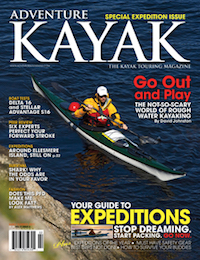In this economically diverse world, paddling can possess a range of meanings for different people.
For westerners, kayaks are not vital. Despite being a passion or even a way of life, for us, paddling remains a recreational pursuit. On the other hand, for millions elsewhere in the world, human-powered watercraft serve as fundamental hunting or fishing tools, or as means of transportation critical to basic local economies.
Though our motivations to paddle may be worlds apart, the kayak shines as a starting point for us to reach out—common ground among different cultures. Traditional approaches to building a dugout pirogue, for example, take skills, tools and techniques passed on from generation to generation. Likewise, the craftsmanship of modern sea kayak builders is built on similar customs.
When we paddle at home, we often acknowledge our local waterways through conservation and management, protecting the places we love. However, when traveling to paddle in underdeveloped areas, we need to broaden our perspective on stewardship. The people should be of as much concern as the surrounding natural landscape. It seems deeply unfair to raise and spend thousands of dollars on an expedition and leave behind little positive impact on local communities.
By keeping informed of global issues, realizing our potential to make a difference and starting small within our kayaking clubs or weekend paddling groups, our awareness may inspire something more.
Distance and economic disparity can be overcome by celebrating a common denominator. Paddling is the perfect fit.
Lake Malawi, or Lake Nyassa as it is referred to locally, is the perfect proving ground for sea kayakers looking to accomplish more through their paddling. Straddling the borders of Malawi, Mozambique and Tanzania, Nyassa is the third largest lake in Africa, the eighth largest in the world. Its waters provide habitat for countless species of fish and its shorelines are home to hippos, monkeys, crocodiles and painted dogs. But in order to overcome the one-sided, consumptive nature of so many international trips, a truly successful expedition must focus on the people who inhabit the massive lake’s coastline.
The region could benefit greatly from navigation safety education to decrease a high annual drowning death toll. To bolster sustainable economic growth, area guides need training to establish a stable and reputable eco-tourism industry. These issues are important to boaters who value life on and around the water, be they western expedition paddlers who are passionate about their lifestyle or Africans who rely on the lake for sustenance.
Distance and economic disparity can be overcome by celebrating a common denominator. For the people of Lake Nyassa, the kayak is a perfect fit. Paddlers planning international expeditions have the potential to show solidarity in their endeavors. By doing so, they’ll give the world at large one more reason to get involved in kayaking—benevolence.
Joao Simoes is the leader of Kayaking for the People (KFTP), a Portuguese not-for-profit organization founded to tackle third world medical, agricultural and educational projects. For more info on the KFTP project visit kayakingforthepeople.org.




